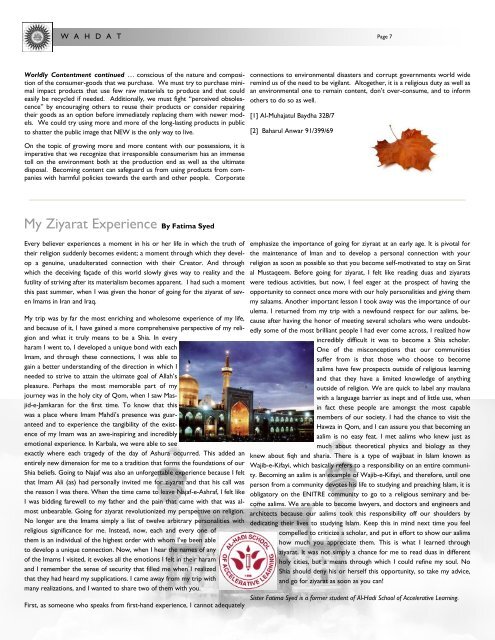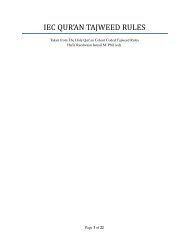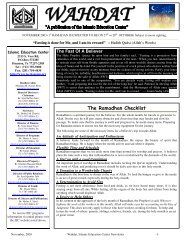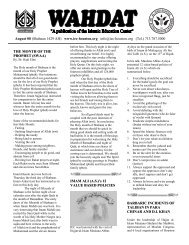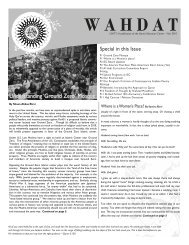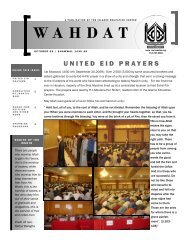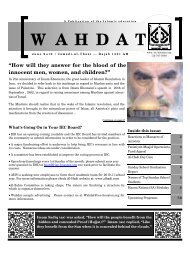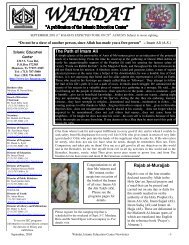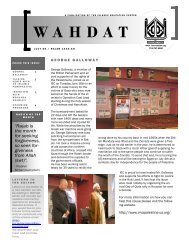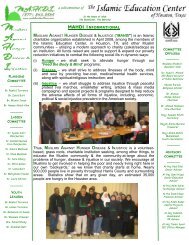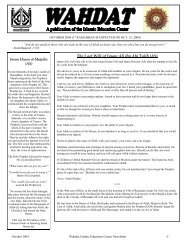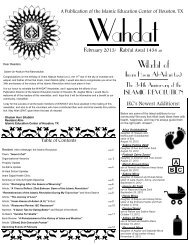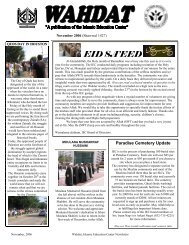October 2010 - Islamic Education Center
October 2010 - Islamic Education Center
October 2010 - Islamic Education Center
You also want an ePaper? Increase the reach of your titles
YUMPU automatically turns print PDFs into web optimized ePapers that Google loves.
W A H D A TPage 7Worldly Contentment continued … conscious of the nature and compositionof the consumer-goods that we purchase. We must try to purchase minimalimpact products that use few raw materials to produce and that couldeasily be recycled if needed. Additionally, we must fight “perceived obsolescence”by encouraging others to reuse their products or consider repairingtheir goods as an option before immediately replacing them with newer models.We could try using more and more of the long-lasting products in publicto shatter the public image that NEW is the only way to live.On the topic of growing more and more content with our possessions, it isimperative that we recognize that irresponsible consumerism has an immensetoll on the environment both at the production end as well as the ultimatedisposal. Becoming content can safeguard us from using products from companieswith harmful policies towards the earth and other people. Corporateconnections to environmental disasters and corrupt governments world wideremind us of the need to be vigilant. Altogether, it is a religious duty as well asan environmental one to remain content, don‟t over-consume, and to informothers to do so as well.[1] Al-Muhajatul Baydha 328/7[2] Baharul Anwar 91/399/69My Ziyarat Experience By Fatima SyedEvery believer experiences a moment in his or her life in which the truth oftheir religion suddenly becomes evident; a moment through which they developa genuine, unadulterated connection with their Creator. And throughwhich the deceiving façade of this world slowly gives way to reality and thefutility of striving after its materialism becomes apparent. I had such a momentthis past summer, when I was given the honor of going for the ziyarat of sevenImams in Iran and Iraq.My trip was by far the most enriching and wholesome experience of my life,and because of it, I have gained a more comprehensive perspective of my religionand what it truly means to be a Shia. In everyharam I went to, I developed a unique bond with eachImam, and through these connections, I was able togain a better understanding of the direction in which Ineeded to strive to attain the ultimate goal of Allah‟spleasure. Perhaps the most memorable part of myjourney was in the holy city of Qom, when I saw Masjid-e-Jamkaranfor the first time. To know that thiswas a place where Imam Mahdi‟s presence was guaranteedand to experience the tangibility of the existenceof my Imam was an awe-inspiring and incrediblyemotional experience. In Karbala, we were able to seeexactly where each tragedy of the day of Ashura occurred. This added anentirely new dimension for me to a tradition that forms the foundations of ourShia beliefs. Going to Najaf was also an unforgettable experience because I feltthat Imam Ali (as) had personally invited me for ziyarat and that his call wasthe reason I was there. When the time came to leave Najaf-e-Ashraf, I felt likeI was bidding farewell to my father and the pain that came with that was almostunbearable. Going for ziyarat revolutionized my perspective on religion.No longer are the Imams simply a list of twelve arbitrary personalities withreligious significance for me. Instead, now, each and every one ofthem is an individual of the highest order with whom I‟ve been ableto develop a unique connection. Now, when I hear the names of anyof the Imams I visited, it evokes all the emotions I felt in their haramand I remember the sense of security that filled me when I realizedthat they had heard my supplications. I came away from my trip withmany realizations, and I wanted to share two of them with you.First, as someone who speaks from first-hand experience, I cannot adequatelyemphasize the importance of going for ziyraat at an early age. It is pivotal forthe maintenance of Iman and to develop a personal connection with yourreligion as soon as possible so that you become self-motivated to stay on Siratal Mustaqeem. Before going for ziyarat, I felt like reading duas and ziyaratswere tedious activities, but now, I feel eager at the prospect of having theopportunity to connect once more with our holy personalities and giving themmy salaams. Another important lesson I took away was the importance of ourulema. I returned from my trip with a newfound respect for our aalims, becauseafter having the honor of meeting several scholars who were undoubtedlysome of the most brilliant people I had ever come across, I realized howincredibly difficult it was to become a Shia scholar.One of the misconceptions that our communitiessuffer from is that those who choose to becomeaalims have few prospects outside of religious learningand that they have a limited knowledge of anythingoutside of religion. We are quick to label any maulanawith a language barrier as inept and of little use, whenin fact these people are amongst the most capablemembers of our society. I had the chance to visit theHawza in Qom, and I can assure you that becoming anaalim is no easy feat. I met aalims who knew just asmuch about theoretical physics and biology as theyknew about fiqh and sharia. There is a type of wajibaat in Islam known asWajib-e-Kifayi, which basically refers to a responsibility on an entire community.Becoming an aalim is an example of Wajib-e-Kifayi, and therefore, until oneperson from a community devotes his life to studying and preaching Islam, it isobligatory on the ENITRE community to go to a religious seminary and becomeaalims. We are able to become lawyers, and doctors and engineers andarchitects because our aalims took this responsibility off our shoulders bydedicating their lives to studying Islam. Keep this in mind next time you feelcompelled to criticize a scholar, and put in effort to show our aalimshow much you appreciate them. This is what I learned throughziyarat. It was not simply a chance for me to read duas in differentholy cities, but a means through which I could refine my soul. NoShia should deny his or herself this opportunity, so take my advice,and go for ziyarat as soon as you can!Sister Fatima Syed is a former student of Al-Hadi School of Accelerative Learning.


